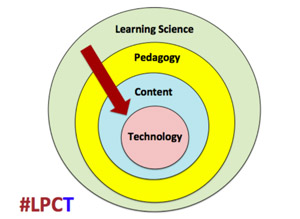 Do you remember what happened Nov. 4, 2008? If you said the election of the United States’ first African American president, you would be correct. But that’s also the day I began fearing technology and its negative impact on the teaching profession. That was the day I got the indisputable confirmation that technology would change the profession whether we wanted it to or not.
Do you remember what happened Nov. 4, 2008? If you said the election of the United States’ first African American president, you would be correct. But that’s also the day I began fearing technology and its negative impact on the teaching profession. That was the day I got the indisputable confirmation that technology would change the profession whether we wanted it to or not.
That evening I watched CNN’s Anderson Cooper in Atlanta interview will.i.am in Chicago using a 360degree holographic projection, not teleconferencing and not video conferencing. You might say, “What does that have to do with teaching?” Everything!
Would you love to have J.K. Rowling in your classroom reading Harry Potter to your children? Who wouldn’t love Neil deGrasse Tyson in their classroom every day to teach physics? Why not invite Elie Wiesel to your classroom to talk about his experiences in the Holocaust? If all those things are possible using technology, why do we need teachers?
As Laura McKenna from The Atlantic lamented the nationwide teacher shortage, she also mentioned how many states are implementing virtual education programs as a solution. TED million-dollar prize winner Sugata Mitra even suggested we build a school in the cloud through the use of technology rather than relying on conventional schools with teachers.
Since then, however, I had a change of heart. As I reconsider my role as the classroom teacher, I can’t help but be grateful for this new Golden Age of Technology. Why? Because I finally understood what Seymour Papert meant when he said, “The role of the teacher is to create a condition for invention rather than provide ready made knowledge.”
The transformation began with gaining knowledge on learning science and better information on technology implementation in schools. For instance, when I saw that of 12,725 students who attempted Duke’s first-ever MOOC course, only 313 students completed it, I felt vindicated for thinking hybrid or so-called blended learning models makes the most sense in today’s information economy. Even after learning about the TPACK Framework advocated by Matthew Koehler and Punya Mishra—which puts equal importance among technological, pedagogical, and content knowledge of a teacher's knowledge base—I am more convinced than ever that a teacher’s technological knowledge is always subordinate to his or her content and pedagogical knowledge. A teacher with superior pedagogical knowledge can turn the most primitive piece of technology such as a paper and pencil into the best possible learning tool for his or her students.
Of course, I am not saying advanced technology is not important. It is vitally important in today’s learning environment. However, I am simply arguing that we should never forget the importance of good teaching that must accompany the tools.
Kentaro Toyama, associate professor of technology and global development at the University of Michigan, emphasized such a sentiment. Based on the research conducted in India where Sugata Mitra’s “school in the cloud” originated, Toyama found that less technology with superior pedagogy yielded better student learning than advanced technology without great teaching. As we learned from the error in judgement from the LA Unified School District's iPad debacle, no amount of instructional technology can yield good student learning without a solid pedagogy based on sound learning science.
As we think more about education technology, let us never forget that even with the best piece of technology such as his lightsaber, Luke Skywalker had to carry Yoda on his back to learn to be the best Jedi he could become. Yes, my students can learn great math skills from Khan Academy videos and learn foreign language from Duolingo on their smartphones, but without a caring teacher in their classroom to provide a solid context for learning, they will not succeed as well as they could. I am sure of it.
 Kip Glazer is a native of Seoul, South Korea, and immigrated to the United States in 1993 as a college student. She holds California Single Subject Teaching Credentials in Social Studies, English, Health, Foundational Mathematics, and School Administration. In 2014, she was named the Kern County Teacher of the Year. She earned her doctorate of education in learning technologies at Pepperdine University in October 2015. She has presented and keynoted at many state and national conferences on game-based learning and educational technologies. She has also consulted for Center for Innovative Research in Cyberlearning and the Kennedy Center ArtsEdge Program.
Kip Glazer is a native of Seoul, South Korea, and immigrated to the United States in 1993 as a college student. She holds California Single Subject Teaching Credentials in Social Studies, English, Health, Foundational Mathematics, and School Administration. In 2014, she was named the Kern County Teacher of the Year. She earned her doctorate of education in learning technologies at Pepperdine University in October 2015. She has presented and keynoted at many state and national conferences on game-based learning and educational technologies. She has also consulted for Center for Innovative Research in Cyberlearning and the Kennedy Center ArtsEdge Program.